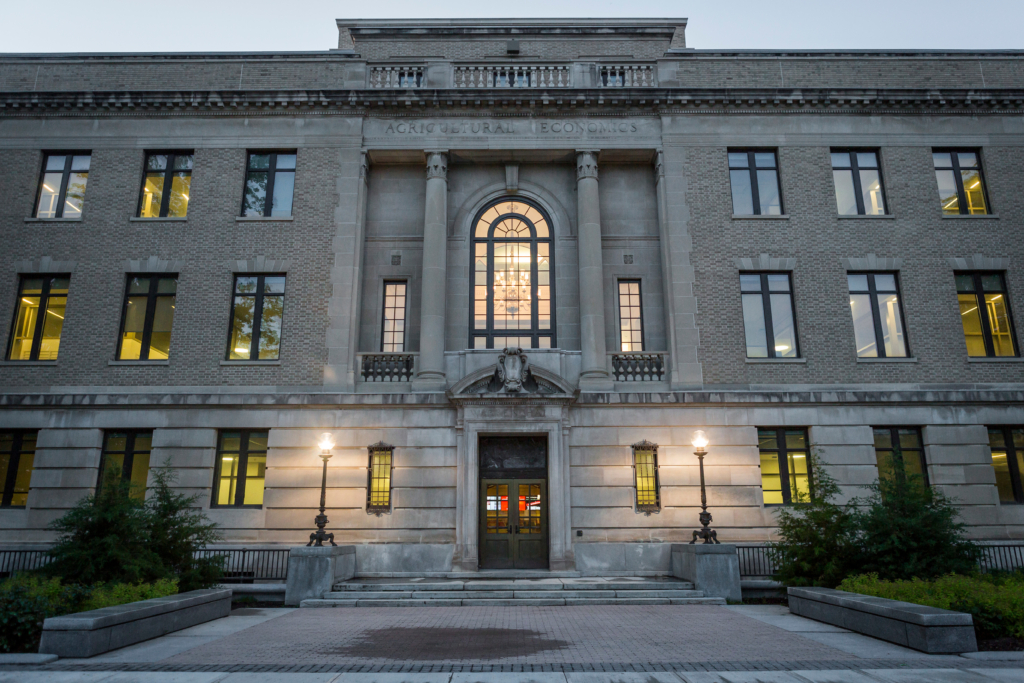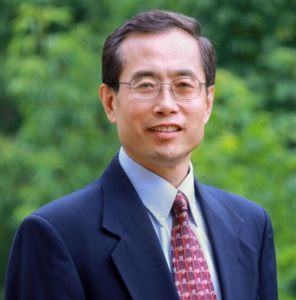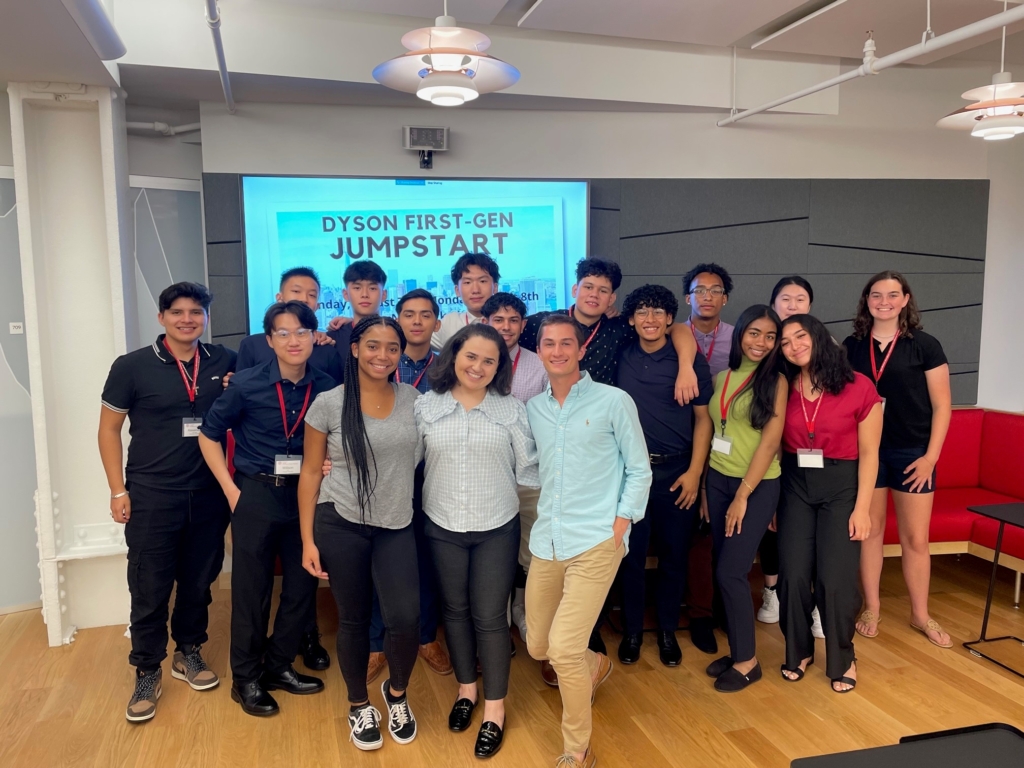
Dyson BBW Student Panel. Photo by Simon Wheeler for Cornell University
Cornell University Charles H. Dyson School of Applied Economics & Management
One of just two Ivy League schools to offer an undergraduate business degree, Cornell University’s Charles H. Dyson School of Applied Economics & Management is a model in consistency in excellence.
It’s ranked in the top 20 every year it has participated in our annual ranking of the best undergraduate business programs in the country. This year, it catapulted up 10 spots into the top 10 of the 2023 ranking. It ranked No. 6, up from No. 16 in 2022’s ranking and No. 9 in 2021’s.
It also proved to be the hardest program to get into. This year’s acceptance rate of 4.17% was at an all-time low and was the most selective of any of the ranked B-schools. Meanwhile, its average starting salaries for its 2022 graduates was the fifth highest of all at $88,897, up nearly $9,000 from last year’s average salary of $79,777. Combined with average signing bonuses, Cornell business grads had an adjusted average first-year compensation of $94,206.
All Cornell business students must complete a group of core courses, a set of liberal arts courses, and pick at least one of more than a dozen concentrations. An aspect that sets Dyson’s curriculum apart from others is it is technically a part of both the College of Business and the College of Agricultural and Life Sciences.
After its 10-point jump in the rankings for 2023, we’ll be watching to see what this leading undergraduate business program has in store for the year ahead.

Warren Hall, home of the Charles H. Dyson School of Applied Economics & Management at Cornell University. Courtesy photo
P&Q INTERVIEW WITH CORNELL’S CHARLES H. DYSON SCHOOL OF APPLIED ECONOMICS & MANAGEMENT
We reached out to the Dyson School to talk about their leading undergraduate business program. Answers were prepared by Dyson Dean Jinhua Zhao, Senior Program Director Aija Leiponen, and members of the offices of student services and advising, admissions, and career management. Their answers are presented below.
What are recent and upcoming program developments and innovations that will enhance the experience of future students?
We’re pleased to share that the Dyson School has initiated new cross-college opportunities for all students. As part of the Cornell SC Johnson College of Business, which is also home to the Peter and Stephanie Nolan School of Hotel Administration and the Samuel Curtis Johnson Graduate School of Management, Dyson School students now have the opportunity to engage with college-wide faculty and course offerings. Working from the strengths and connections across Cornell and the college, the Dyson School has also begun to create intentional engagement opportunities between Engineering and Life Sciences graduate students. These joint ventures allow students to benefit from the leadership skills from real-world experiences of other undergraduate and graduate students and greatly enhance the overall educational experience. Participation in collaborative co-curricular and extra-curricular activities with students across schools are also offered in leadership and entrepreneurship programs.
One of the main attributes of the Dyson program is that students have access to leading experts in the world in sustainable business, environmental economics and ESG. One of the concentrations which aligns with our ethos is the Sustainable Business Economic Policy (SBEP). This concentration is designed to help students understand the business challenges and opportunities that arise as society addresses pressing issues related to the environment, Earth’s resources and climate change. Students in SBEP study the inter-relationships among business, the economy, and the environment. They examine the role of sustainability in business and economic development and learn how to design policies and management strategies to promote sustainability, environmental protection, clean technologies, and the sustainable use of natural resources. By instilling the Dyson ethos of “Our business is a better world,” the SBEP concentration is intended to prepare students for careers in a variety of industries (e.g., energy, clean tech, finance, consulting), environmental NGOs, government agencies and international organizations.

Jinhua Zhao, dean
Another example of Dyson’s approach to business education is the Student Multidisciplinary Applied Research Teams (SMART) Program. It is a unique service-learning program that brings together teams of both graduate and undergraduate students, faculty, and staff from across the university and pairs them with small companies, organizations, and community groups located in developing countries and emerging economies. Over 100 teams and 500 students have participated since the program’s inception in 2002. The SMART program provides students with an innovative service-learning experience working with under-served businesses, NGOs, universities, and rural communities in developing countries. It offers students a greater understanding of private and public sector led economic development and improves students’ analytical abilities to develop case studies and other academic analyses of emerging markets issues. It also facilitates learning to work in a multidisciplinary team to conduct problem-solving research and provides technical assistance and analytical support to under-served and resource-poor businesses, NGOs, and communities in emerging markets.
What are your program’s two biggest differentiators from other top undergraduate business programs? How do these prepare students for their careers?
The Dyson School holds traditional strengths in the areas of finance, accounting, business analytics and marketing and it also benefits tremendously from a unique connection to Cornell’s College of Agriculture and Life Sciences (CALS). The connection to CALS is truly interdisciplinary and offers a broad set of educational opportunities and faculty expertise in areas of food and energy systems, life sciences, sustainability, and social sciences.
“Our Business Is a Better World” is the unifying principle, which all of Dyson School’s programs draw from. It applies equally whether students concentrate in finance, marketing, or international development. Our well-trained and talented students succeed in business not only because they have the strong skills, but also because they understand how business decisions can directly and dramatically impact society. Dean Zhao’s vision is for Dyson’s graduates to become rigorous and integrative thinkers, innovative leaders, engaged and globally aware citizens, and continuous learners. As part of the program and fulfilling the dean’s outlook, Dyson students complete a multi-year sequence of Grand Challenges courses. The Grand Challenges program enhances student’s understanding about the United Nations Sustainable Development Goals through coursework that culminates in a team-based capstone project with an outside company or organization and focuses on positive societal impact. By being immersed in the program, our students become socially responsible leaders who utilize their experiences to become community-engaged and globally aware.
Through the Grand Challenges program, students gain core competencies increasingly in demand by employers as signs of maturity and career readiness and these skills include communication, teamwork, critical thinking, cultural humility, global awareness and client relations skills. While completing the required sophomore writing course, the pre-project immersion for juniors, and the senior project course, students work with peers, faculty, and external partners to become confident and thoughtful leaders who can tackle business challenges .
Examples from a recent Capstone Project include students who have worked with CleanWatts, a Clean Energy tech company, with a focus on energy decarbonization. The CleanWatts’ team runs a suite of energy management software platforms tailored to a company or community’s location, economics and industry needs. Another group is working to support GROAM, an Agritech and Biotech Foaming technology for agri-waste as they focus on reducing the footprint of polymeric foam by providing biodegradable foamed materials made from agricultural biomass waste.
What separates your graduates from other business school graduates?
Our graduates have strong analytical skills by being technically trained in the latest analytical methods. They are also excellent communicators and problem solvers. They are experienced in high-pressure teamwork, sensitive to diversity, equity and inclusion in the workplace and in the economy. As entrepreneurial self-starters they have the ability to navigate complex environments to gain access to resources, advice, and ideas. Embedded throughout the curriculum are opportunities for students to develop a deep understanding of how to position their careers to use business for the greater societal good.
Each spring the Dyson Undergraduate Council hosts our student-led “Better Business Week,” an initiative driven entirely by students to feature the positive forces businesses can bring to society. This year, Dyson alumnus Steven Izen ’13, returned to campus for this special event and served as the keynote speaker and Dean’s Distinguished Lecturer. Steven is the Founder and CEO of Lokai and shared an inspiring talk about how his company gives back to charities with every purchase.

Cornell Dyson first generation students. Courtesy photo
Explain the career services, programming, and extracurriculars that give your students an advantage in career outcomes?
At Dyson, we introduce career services and professional development during the first year to encourage students to engage as soon as possible. Dyson Career Services offers an orientation, a first-year seminar course, as well as a first-year management communication course, which enable students to know the roadmap through their college journey. This process also allows the Dyson Career Services to begin building a relationship with students at an early stage, which ultimately helps to enhance future career outcomes.
At Dyson, career services means more than job search assistance. Diverse career and professional development opportunities are available and range from one-on-one coaching to on-campus job fairs and career-focused clubs. In addition, Dyson students can build strong connections with alumni from around the globe, which strengthens relationships with recruiters and employers. Our students are continually recruited by top employers in the public, private, and nonprofit sectors.
Dyson students are leaders in the most impactful clubs and student organizations at Cornell including BlackGen Capital, A Seat at the Table, Forte, Cornell Alpha Fund, Cornell Finance Club, Food Fellows, Cornell Marketing Club, Cornell Consulting Club, and Entrepreneurship at Cornell. Dyson students also actively engage with the School through the Dean’s Student Advisory Council, the Dyson Undergraduate Council, and the Dyson Diversity Council.
What are two key qualities that prospective students must possess to land a spot in your program?
The Dyson School makes it a priority to review candidate applications holistically. We are interested in all facets of an applicant’s profile, above-and-beyond academic ability. If limited to only “two key qualities,” we would emphasize the combination of the following: quantitative interest and ability. This is most frequently demonstrated on the transcript by students who pursue a rigorous path in math and science-related courses in high school. As an extension of Dyson’s better-world ethos, the most competitive applicants are those who not only articulate, but also demonstrate an interest in addressing societal problems and promoting shared prosperity through their activities and engagement.
When alumni look back on their time in your undergraduate business program, what would they consider to be their signature experience?
Our alumni share that the strong sense of community within the Dyson School and working closely with professors are defining experiences. A recent Dyson alum noted: “I came to Dyson undergrad 10 years older than my cohort and for the most part from a much less privileged background. And I must say, the students, the faculty and staff treated me with the utmost kindness and respect. They are well-mannered, and incredibly smart and driven people. What an honor to have passed through those halls.”
With a cohort of about 250 students per class year, the close-knit Dyson community allows our Dyson students to quickly develop a rapport with their professors and support staff. Signature experiences include the Summer Book Read, serving as Course Assistants, working on faculty research projects, or experiential learning opportunities domestically and abroad. After a rewarding undergraduate experience, our students become engaged alumni who want to give back to the next generation. Dyson’s strong alumni network participate in various signature events, mentor students, and provide financial support for entrepreneurship projects, international study trips, career treks, as well as basic needs such as professional and winter clothing.
What is the most underrated feature of your undergraduate business program and how does it enhance the experience for your business majors?
While somewhat invisible to the outside, Dyson students have an extensive network of support from the Student Experience Team within Warren Hall, including the Office of Student Services & Advising, the Office of Diversity and Inclusion, and Dyson Career Services, which is a vital piece of student success and support in the Dyson School.
The team of professionals within each office is focused on supporting Dyson students throughout their educational journey. They help students navigate the ups and downs that are part of all college experiences. Starting with a comprehensive virtual onboarding program throughout the summer for new students, a First-Generation Jumpstart event with alumni and current students in NYC, and Design Your Dyson, a first-year seminar course, students are exposed to the professional staff who are committed to supporting all students. Throughout their time in Dyson, students have the opportunity to participate in more than 100 academic, diversity, and professional development events, as well as events with a focus on community-building and wellness. When students are part of a community in which they feel connected, supported, and appreciated, they will be able to confidently focus on their education.
The Dyson Student Experience Team strives to prevent roadblocks that limit student engagement and develop meaningful relationships. They work with students to celebrate academic successes, athletic accomplishments, research skills, internship experiences, or new job offers, and provide a place of understanding and encouragement.
Which employers are the biggest consumers of your undergraduate talent and what have they told you about your alumni that make them so special?
Dyson’s reputation is strong among many industries, and employers rave about the level of qualitative and critical thinking skills, work ethic, and collaborative nature of Dyson graduates. Our alumni start and grow their careers with some of the most recognizable names in financial services, banking, consulting, technology, consumer products, and agribusiness.
What else would you like readers to know about your program?
The Dyson School is a close-knit community where students are both competitive and collaborative, with collective understanding that a peer’s success is a shared success. While the rigorous curriculum is challenging, students can find a balance in activities outside the classroom and are supported by a dedicated faculty, staff and alumni network.
Our faculty, students, and alumni are united by our ethos, “Our Business is a Better World”. The Dyson School has been focused on regional and global economic development and environmental sustainability of business for decades, well before sustainable business became widely appreciated.
Our program continues to hire exciting and impressive research faculty, enhance curricular and co-curricular opportunities for all students, and provide comprehensive student support to ensure we remain at the forefront of producing alumni who are united by the ethos “Our Business is a Better World.”
NEXT PAGE: Towson University College of Business & Economics











Questions about this article? Email us or leave a comment below.